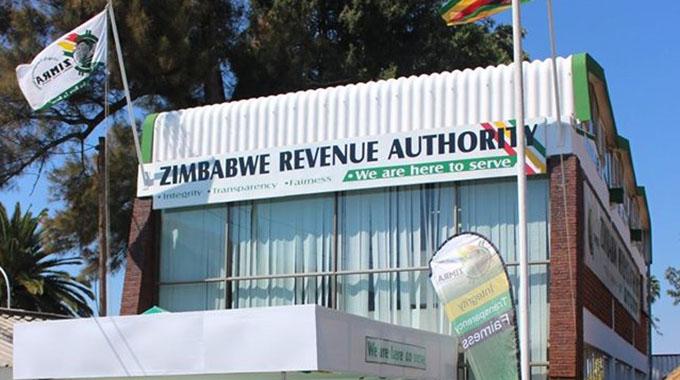News / National
Zimra happy with block tax system
28 Feb 2023 at 07:36hrs |
148 Views

THE Zimbabwe Revenue Authority (Zimra) says it is satisfied with the preliminary results of the Block Management System (BMS) that classifies all taxpayers into specific geographical locations or zones to improve tax collections from the informal sector.
An informal sector economy or shadow economy is part of any economy that is neither taxed nor strictly monitored by the Government. The size of Zimbabwe's informal economy is estimated to be 64,1 percent of the gross domestic product.
The BMS came into effect on January 1 this year. The system entails zoning taxpayers by geographical location and assigning Zimra officials to manage all taxpayers within a given zone or block.
The zoning will include central business districts, flea markets, farms, industrial areas as well as informal traders' and rural business locations."
Under the BMS, Zimra officials are engaging all taxpayers through door-to-door visits, checking on all tax compliance issues including daily sales schedules, registration for tax purposes, returns submission, payment of taxes and fiscalisation.
"BMS is at its initial stages and is aimed at also capturing the informal businesses to expand the taxpayer base," Zimra spokesperson Mr Gladmore Njanji said last week.
"The main focus for BMS is the small and informal clients. It will cover all niches used for business, which means all business types will be captured.
"We are engaging the taxpayers and they are very receptive to our initiative. The initial good results and cooperation are a sure promise of effectiveness. So far we have engaged taxpayers in areas like CBD, Mbare, Glenview, and flea markets where informal businesses are situated," he said.
Last year, Finance and Economic Development Minister Mthuli Ncube said revenue collections would be enhanced through rationalisation of tax expenditures incurred as a result of generous fiscal concessions, particularly in mining, and complemented by measures to modernise tax systems, broaden the tax base, as well as introduce more efficient ways of raising money from the informal sector
Mr Njanji said Zimra will engage more officers to ensure an effective rollout of the BMS.
"The general challenge is that the task is quite substantial and we are resourcing as we go," said Mr Njanji. "We have also noted additional offices will be required in some areas to ensure the convenience of staff operating from the blocks which are being addressed.
"The aim is to bring Zimra to the client's doorstep. We have noted that some clients have no proper records of accounting and as such BMS will educate them on record keeping."
While the illegal sanctions have frustrated the Government's economic programmes has instead created empowered individuals who no longer rely on formal employment.
The hostile sanctions agenda aimed at bringing the economy to its knees has instead created a new revolutionary economic and social paradigm. The culture of being an employee in big businesses has been replaced by an empowerment mentality in which the man in the street has effectively become "his own boss."
While a lot of workers have been thrust into this situation as a result of job losses in the formal sector, there has been a substantial redistribution of wealth from big business to small business, thereby empowering previously un-empowered workers.
An informal sector economy or shadow economy is part of any economy that is neither taxed nor strictly monitored by the Government. The size of Zimbabwe's informal economy is estimated to be 64,1 percent of the gross domestic product.
The BMS came into effect on January 1 this year. The system entails zoning taxpayers by geographical location and assigning Zimra officials to manage all taxpayers within a given zone or block.
The zoning will include central business districts, flea markets, farms, industrial areas as well as informal traders' and rural business locations."
Under the BMS, Zimra officials are engaging all taxpayers through door-to-door visits, checking on all tax compliance issues including daily sales schedules, registration for tax purposes, returns submission, payment of taxes and fiscalisation.
"BMS is at its initial stages and is aimed at also capturing the informal businesses to expand the taxpayer base," Zimra spokesperson Mr Gladmore Njanji said last week.
"The main focus for BMS is the small and informal clients. It will cover all niches used for business, which means all business types will be captured.
Last year, Finance and Economic Development Minister Mthuli Ncube said revenue collections would be enhanced through rationalisation of tax expenditures incurred as a result of generous fiscal concessions, particularly in mining, and complemented by measures to modernise tax systems, broaden the tax base, as well as introduce more efficient ways of raising money from the informal sector
Mr Njanji said Zimra will engage more officers to ensure an effective rollout of the BMS.
"The general challenge is that the task is quite substantial and we are resourcing as we go," said Mr Njanji. "We have also noted additional offices will be required in some areas to ensure the convenience of staff operating from the blocks which are being addressed.
"The aim is to bring Zimra to the client's doorstep. We have noted that some clients have no proper records of accounting and as such BMS will educate them on record keeping."
While the illegal sanctions have frustrated the Government's economic programmes has instead created empowered individuals who no longer rely on formal employment.
The hostile sanctions agenda aimed at bringing the economy to its knees has instead created a new revolutionary economic and social paradigm. The culture of being an employee in big businesses has been replaced by an empowerment mentality in which the man in the street has effectively become "his own boss."
While a lot of workers have been thrust into this situation as a result of job losses in the formal sector, there has been a substantial redistribution of wealth from big business to small business, thereby empowering previously un-empowered workers.
Source - The Herald
Join the discussion
Loading comments…





